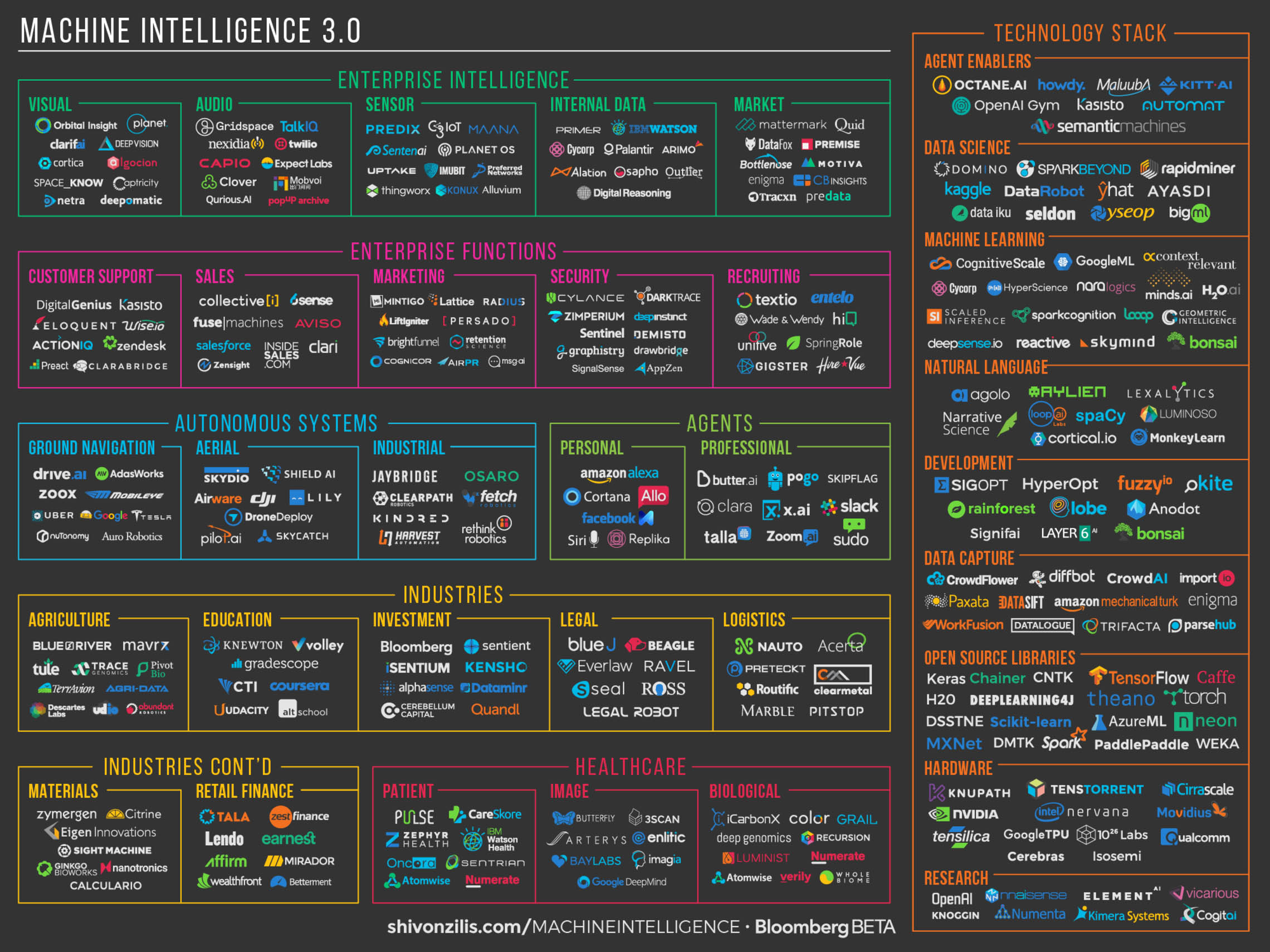The silent proliferation of Machine Learning
We’re living in a world where slowly, but surely, the services we’re surrounded by are adopting more and more features driven by machine learning systems.
As a consumer you’re never really told that a service you use is ML based, you just use it. Amazon uses Machine Learning to improve the quality of the recommendations they make to their customers, for example.
You’d be entirely forgiven for having no idea ML was there. For the right things, ML can improve a service where ‘classic’ Algorithms might fail or be wrong more often.
This makes me wonder.
As SEOs, has the emergence of Machine Learning in search changed our day to day activities? Will it in the future?
What is ML useful for and where does it fall short?
A quick scout around the Internet yields a large list of applications for ML. Have a look at threads like this on Quora, and you’ll see just how wide-reaching the application of ML is.

The Current State of Machine Intelligence 3.0 (Source)
In Biology, it’s used in drug development and design.
In Finance, it’s involved in credit risk modelling and scoring, predicting if a credit applicant is credit-worthy, and fraud detection (if you’ve ever had a transaction blocked because of an ‘unusual’ transaction you’ll probably disagree that the process was enhanced by Machine Learning).
Machine Learning is also used to find promising future trends on the stock market and conduct high frequency trading.
In Astronomy, ML is used to find interesting objects in large amounts of Astronomical data.
Auto Pilot systems which can save lives in self driving cars.
Prediction models found in a number of physical, IOT devices like Nest.
There are examples of ML all over the Internet, in ad targeting, image recognition, facial recognition, speech recognition, automated email assistants, product recommendations, content recommendations, translation services and so on.
So, the use case for ML is to derive and predict patterns in large amounts of data. This is precisely why the problem of ranking web pages is incredibly well suited to ML.
Machine Learning: Google’s vision – Google I/O 2016
For a layman’s view of where ‘we’ are with ML as a discipline, this is a great panel discussion to develop a sense of the types of things currently possible in ML.
The panel was recorded at Google I/O last year with Googlers John Giannandrea (Head of Search and Machine Intelligence at Google), Jeff Dean (Leads Google Brain Research Group), Aparna Chennaprgada Director of Product, Google Now, Google Search and YouTube.
There are lots of very interesting points made in the session:
- ML is rapidly improving. In speech recognition or facial recognition the development of these services is dramatically reducing the errors encountered compared to a few years ago.
- Google ‘got serious’ about AI ‘about 4 years ago’.
- While ML is a very impressive technology it’s also very limited in some types of applications:
“Language and dialogue is the big unsolved problem in computer science. For example reading a long article and writing a shorter version of it is currently beyond the state of the art.”
An activity requiring physical environment manipulation, requiring hand/eye coordination and the ability to learn many complex physical tasks (think Hospital care or performing tasks to assist the elderly) is a very long way away.
Machine Learning isn’t very ‘transferable’. You have to build a system to perform one task but those learnings aren’t particularly transferable to another type of task. A model trained to play Go couldn’t play Chess.
Should I worry about how Machine Learning affects SEO?
This is the question I’ve been struggling to reconcile. Does the proliferation and wider availability of Machine Learning tools make it a given that practitioners in Organic Search should feel compelled to change how they work?
Are we doing anything differently because Google uses Machine Learning?
Read every single article on ML written from the perspective of SEO and you’ll notice that they all conclude with the usual Quality Rater inspired recommendations.
- Pay attention to content developed to answer queries well
- Use research to develop a better understanding of a topic as a whole
- Focus on user engagement, time on site and other factors that may indicate a page has answered a query well
- Avoid page layouts that are ads heavy, don’t build pages that use thin or duplicate content, be very careful with the use of interstitials
- Iterate on best practice technical SEO and place an emphasis on testing and observing outcomes
In SEO there’s a natural drive to always improve quality.
My sense is that this is simply a natural consequence of responding to ever improving search algorithms. External competitive factors affect this too. If everyone else is getting better at SEO, then so must you.
Try to identify any SEO tactic that has developed specifically because Google use machine learning in their ranking algorithm. I honestly don’t think I can.
I asked on Twitter and most of the answers fell short of convincing, too.
Where does Machine Learning contribute to SEO?
I found this impressive list of Machine Learning APIs that include OCR, Text Classification, Question Answering tools and so on via this excellent presentation from my friend Jan-Willem Bobbink.
For an SEO, all of these APIs are almost exclusively likely to be used to improve content or enhance research.
I think any attempt to find new tools based on any technology that enhance the SEO process is a very worthwhile activity indeed but I do get the sense that these services are hardly game changing.
Where *could* Machine Learning technology contribute to SEO?
One day, I hope there will lots of opportunities for us to see clever tools and practices emerge that use ML that actually change our day to day. Stuff like predicting Market Opportunities.
I found this article from Will on Moz interesting. In it, he concludes that ML might one day be better at predicting search engine rankings than an experienced SEO. Given a large enough data set I agree. I think it’s possible that ML based tools might reduce the need for experience in SEO to actually do it. As it’s a heavily experience dependent discipline, I find that idea exciting.
A word of warning, though. As Pete puts it,
“Whether or not people can predict what will rank higher is not the question. The question is, can we do things that will improve a site to help it rank better?”
I’d argue that a ML model should be able to recognise the variables enough to correctly guess which page ranks better than another but when you’re actually trying to make changes, you need an experienced hand to decide which changes will actually make the most sense.
Individual recommendations for SEO improvements would be powerful, though. I’m surprised this isn’t more of a thing. The idea would suit most SEO toolsets, a little like Google Analytics Assistant perhaps.
Prediction is the way forward
In the same way Finance applications use ML to spot Stock Market opportunities, I think it might be possible to train a model to predict opportunities in search. This is quite different to predicting which page should outrank another – I’m more interested in queries that are under served and competitively accessible, and (this is where the ML part could play a role) emerging opportunities in the future that will yield returns with a good degree of certainty.
(re)Writing Content
For E-commerce, especially. One of the biggest day to day challenges I see for retail SEO is the horrendously slow process of rewriting product content.
Tools like Automated Insights use Natural Language Generation to create basic analyses of charts and data tables. What would be very impressive would be a ML model that learns the specific use of language particular to a vertical (eg Fashion vs say, Sports gear) *and* learns what language best persuades to conversion.
As we already heard, this is “beyond the state of the art” for now.
Machine Learning needs to solve new problems to be useful
Perhaps we’ve been thinking of Machine Learning in the wrong way; as a mechanism to enhance the processes we already have. But that doesn’t recognise how the power of Machine Learning can be applied.
With open source applications like TensorFlow freely available, we certainly are looking at an exciting period of change ahead of us.
Instead of trying to add ML to our existing processes to achieve a marginal gain in performance, we should be using Machine Learning’s unique power to help us find opportunities and spot deep insights that might otherwise have been missed by a human.
Tool providers that solve this problem will, in my opinion, find some real success.
Sources:
- https://www.oreilly.com/ideas/the-current-state-of-machine-intelligence-3-0
- https://moz.com/blog/machine-learning-for-seos
- https://news.ycombinator.com/item?id=13563892
- https://searchengineland.com/faq-all-about-the-new-google-rankbrain-algorithm-234440
- https://www.quora.com/What-are-some-real-world-examples-of-applications-of-machine-learning-in-the-field
- https://www.wired.com/2016/04/google-supercharging-tensorflow-open-source-ai/
- https://www.recode.net/2016/2/4/11587564/googles-artificial-intelligence-boss-and-why-he-will-run-the-search
- https://www.slideshare.net/AmazonWebServices/build-a-recommendation-engine-using-amazon-machine-learning-in-realtime
